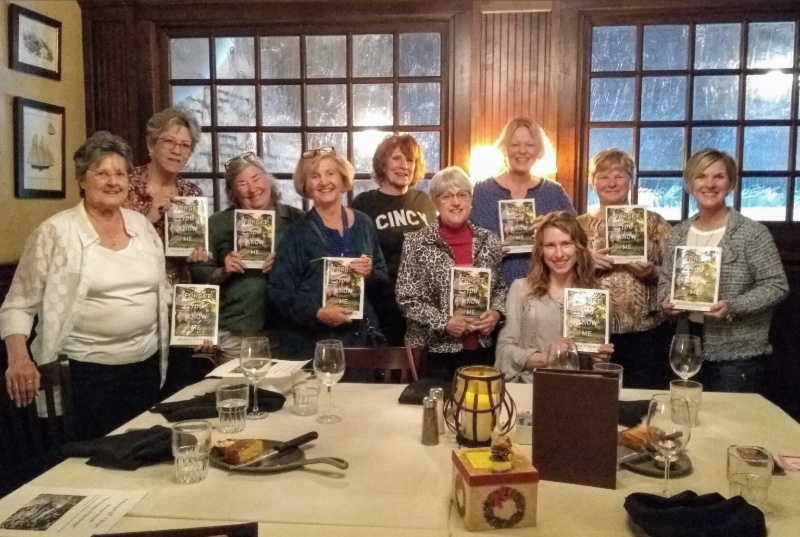
I’ve been visiting with book clubs around Cincinnati for going on three years now. Sometimes, I’m invited to join simple gatherings of neighbors or friends in kitchens or living rooms. Other times it’s a stop into a busy senior center or meeting a group in a restaurant. By the time this year is done, as a part of my term as the Library’s Writer-in-Residence, opens a new window I’ll also have visited with roughly a dozen Library book clubs at branches all over the county to discuss my new paperback, Not That I Could Tell (Interested in joining us? View the schedule here!, opens a new window).
As both an author and an avid reader, I’ve been fascinated to see the many ways groups approach everything from choosing their next read to organizing how the meeting will flow (or, often, how much wine will flow!). I’ve picked up some great pointers along the way—and learned that whenever my schedule allows, these invitations are an easy, enthusiastic YES.
Thinking of starting a book club, or looking to keep the one you have engaging and interesting? Here are some of my favorite takeaways.
1. Reach out to an author.
Having an author visit with your group can add a new layer to your discussion—because whatever you’d wished you could ask the author while you were reading, now you can!
Many readers are unaware that this is an option—but in an era when publishers expect authors to be more hands on with their book promotion, many of us offer open invitations to Skype with book clubs or to visit in person if we are local (or passing through town on book tour). The last club I visited with was so welcoming, I stayed for an extra hour while we all chatted around a counter full of desserts. Many of them told me it was the first time they’d ever met an author and that they hoped it wouldn’t be the last, and I went home with my heart full.
Visit the author’s website and look for a “contact” or “book clubs” or “for readers” tab. Here’s mine, opens a new window—which contains links to free, downloadable discussion guides for all three of my novels as well as easy instructions for contacting me.
Many publishers also publicly list authors who are available for Skype visits, so if you’d like to peruse a lot of options at once, try the reader-focused pages of their websites.
If you think this applies only to lesser-known authors, think again. No. 1 bestselling thriller writer Lisa Scottoline even invites book clubs who read her books to a giant party at her house every year, opens a new window. (Sorry, everyone—my house is not nearly as big as Lisa’s!) All Lisa asks is that all participating readers purchase the book—which, I might add, is good faith practice for any group interested in reaching out to the author. You’re supporting their livelihood, with a bonus for you: a memorable hour and a signed, personalized copy, either for yourself or to give as a gift. Most authors will mail your group autographed bookplates to adhere inside your copies even if visiting via Skype. At the very least, ask non-purchasing members to request the title from the library, prompting your branch to stock it well. (Passing around a single tattered copy can be a little disheartening for the author who took the time away from their family and other obligations to be there.)
2. Aim for at least eight.
Many authors adhere to an eight-member minimum when fielding invitations to visit a group, but I’ve found this a worthwhile policy for readers, too, to ensure meaningful discussion. There will almost always be at least one member who can’t make it to a meeting, and one (or more) who didn’t read/finish the book—whether from running out of time or losing interest. I’ve seen many clubs with too few members dissolve after a few dud months. A more robust group can withstand inevitable bumps more easily.
3. Give ‘em something to talk about.
Some books just lend themselves to discussion better than others. Look for titles with rich material, perhaps a theme that focuses a moral question (Is it ever okay to lie? Is it ever forgivable to cheat?), a big twist you wish you’d seen coming, or elements taken from real life, whether personal—I was inspired to write Not That I Could Tell after losing a friend to domestic violence—or ripped from headlines—think Michelle McNamara’s I’ll Be Gone in the Dark—or intensely researched—Jodi Picoult interviewed hundreds of women and medical professionals on both sides of the pro-choice/pro-life debate in writing A Spark of Light.
Speaking of, a little controversy can be a good thing: Keep it civil, of course, but different perspectives are what make these discussions worth having! Studies have shown that reading makes us more empathetic. Shared reading experiences can open our minds and hearts to other points of view.
If the publisher offers a discussion guide, that’s a good sign the title is ripe for discussion. They’re found in paperback editions and available online as well. Publishers have different ways of calling attention to these on covers; mine include a Reading Group Gold, opens a new window designation.
4. Find a fun tie-in.
Get in the spirit of the book for your meeting! Food and drink are the easiest crowd-pleasers. Using a couple of my recent “Inside the Writer’s Head”, opens a new window guests as examples, you might serve up an Indian dish (or a whole buffet!) to discuss Sonali Dev’s Pride and Prejudice and Other Flavors, offer honey-roasted peanuts, pretzels, and a Bloody Mary bar for David Bell’s Layover, or meet at Lunken Airport’s Sky Galley for dinner to discuss my own Forget You Know Me.
5. Play fair.
For some groups, taking turns picking books and/or hosting meetings works best. Others favor a voting system and potluck approach every time, or choose book titles blindfolded out of a hat. Whatever the method, the important thing is to make sure every reader gets a turn—and a voice.
Until next time,
Jessica Strawser
2019 Writer-in-Residence: Public Library of Cincinnati & Hamilton County
Editor-at-Large: Writer's Digest
Novelist: Almost Missed You, opens a new window • Not That I Could Tell, opens a new window • Forget You Know Me, opens a new window • St. Martin's Press
jessicastrawser.com, opens a new window / t @jessicastrawser, opens a new window / f @jessicastrawserauthor, opens a new window



Add a comment to: Inside the Writers Head: Fun ways to enhance your book club discussions